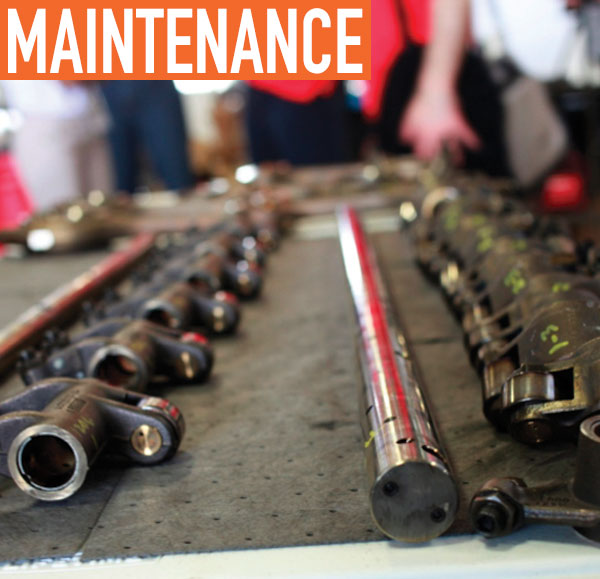The Environmental Protection Agency (EPA), the National Highway Traffic Safety Administration (NHTSA), the American Petroleum Institute (API), and major engine manufacturers have agreed on goals to improve fuel economy and emissions in future medium- and heavy-duty vehicles. Oil technology and engine technology go hand in hand; however, and diesel engine technology has improved significantly over the past several decades. To keep up with diesel engine evolution and meet the aforementioned goals without compromising engine protection requires a new generation of diesel engine oils with completely redesigned specifications.

Featured image: PC11 will reduce engine wear and deposits overall, while PC-11B will meet heavy-duty oil specifications.
Above: Engine oil works to lubricate, cool, clean,and protect engine components.
EFFECTS OF ENGINE EVOLUTION
As engine manufacturers begin to create a new generation of cleaner, more fuel-efficient diesel engines, they need a new generation of higher-performing diesel engine oils to protect them. One way OEMs are improving fuel-efficiency is by running the engine hotter, which increases oxidation—or the amount of breakdown—of the oil. Proposed Category-11 (PC-11) oils offer increased protection against oil oxidation, improved shear stability, and improved aeration control.
The evolution of heavy-duty diesel engine designs has been driven by emission legislation and customers’ requirements for efficiency and reliability. While there has been significant progress, recent regulations coupled with customers’ desires to reduce the total cost of ownership are making fuel economy the most critical driver for engine manufacturers.
Engine changes place significant stress on the oil, which has to lubricate, cool, clean, and protect over long oil-drain intervals. The vehicle industry is starting to recognize that oil can help to achieve an engine’s full potential for fuel economy without compromising hardware durability. So, as engine manufacturers create cleaner, more fuel-efficient diesel engines, they will need a new generation of higher-performing diesel engine oils to protect them.

PC-11 BREAKDOWN
Forthcoming EPA and NHTSA emission legislation for 2017 diesel-powered commercial transport vehicles requires significant improvements in fuel consumption to reduce carbon dioxide emissions. These fuel consumption improvements depend on vehicle class, type, and size, and include specific improvements for medium- and heavy-duty engines. To meet the requirements, Shell began engineering PC-11.
There will be two types of PC-11, identified temporarily as PC-11A and PC-11B. PC-11A oils will be a direct replacement for current CJ-4 oils. PC-11A will be backwards compatible, while PC-11B will have limited backwards compatibility. Future vehicles will use the new PC-11B engine oils, which will be offered in lower viscosity grades and are designed primarily for the next generation of diesel engines, to help maximize fuel economy and performance. These next-generation medium- and heavy-duty vehicles are expected to deliver between 6 and 20 percent better fuel economy, depending on the type of vehicle and usage.
These oils, targeted for licensing in early 2017, will eventually replace the current CJ-4 heavy-duty oils. The new engine oil requirements, especially for PC-11B, are a major change in the industry’s approach to heavy-duty oil specifications. Oil producers will need to continue to deliver excellent wear protection and cleanliness—two factors that help to drive down customers’ maintenance costs and prolong engine life.
WHAT PC-11 MEANS FOR YOU
API licensed oils are used for on- and off-highway applications. The same goes for PC-11 oils, as they will be valid for transport, agriculture, construction, mining, and diesel pickup applications. So, what does PC-11 mean for your fleet? Potential benefits of PC-11 include reduced engine wear and deposits, which saves costs in maintenance and downtime. Fleets changing from current 15W-40—or high HTHS 10W-30—could see greater fuel economy savings. The Shell Rotella brand launched a website called WhatIsPC-11.com, a resource for topics such as the fundamentals of PC-11, impending changes, testing updates, and how it is expected to affect new, current, and older engines when the category replaces API CJ-4 engine oils by 2017. ![]()
FOR MORE INFORMATION:
Find out more about new PC-11 oils at www.whatispc-11.com, a site created by Shell Rotella as a resource.
_______________________________________________________________________
MODERN WORKTRUCK SOLUTIONS: DECEMBER 2015 ISSUE
Did you enjoy this article?
Subscribe to the FREE Digital Edition of Modern WorkTruck Solutions magazine.
![]()




